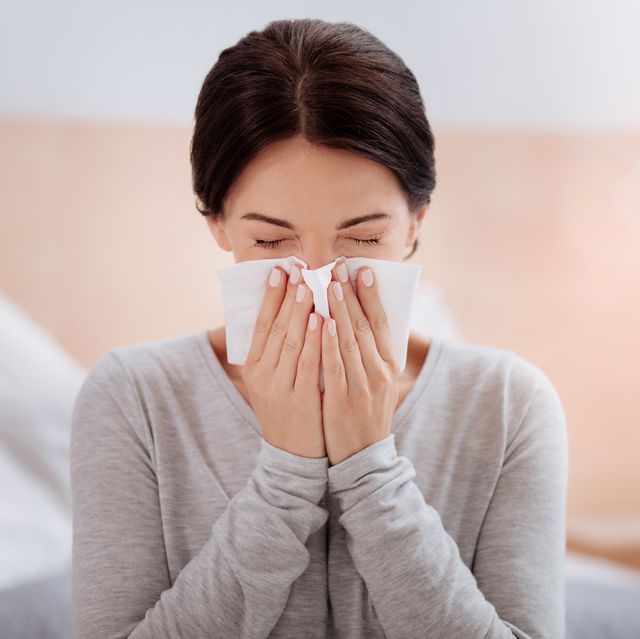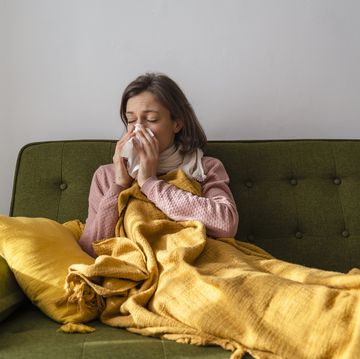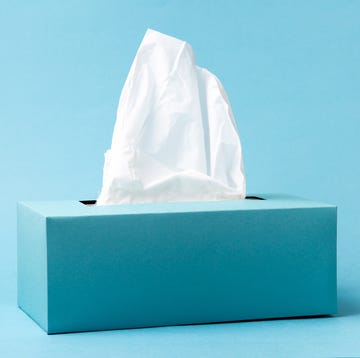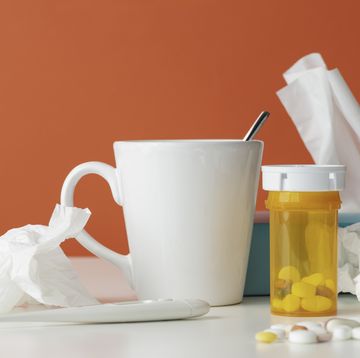This article was medically reviewed by Shonda Hawkins, MSN, a nurse practitioner and member of the Prevention Medical Review Board, on August 16, 2019.
There’s a reason you’re told to get the flu shot every single year: Influenza is a respiratory infection that can potentially turn deadly. In fact, the Centers for Disease Control and Prevention (CDC) estimates that up to 61,200 people died from flu from October 2018 to early May 2019.
The really scary part? The flu can feel a lot like the common cold at first, since the symptoms typically include fever, chills, achy muscles, sore throat, cough, and headaches.
But what if you’re already feeling a bit under the weather in the first place? How sick is too sick to get the flu vaccine? And does it actually matter whether you get vaccinated while you’re ill or after you’ve perked up?
Turns out there are a few legitimate reasons to delay your annual flu shot—but a mild case of the sniffles is probably not one of them. Here, physicians specializing in family medicine and infectious disease explain everything you should know about getting the flu vaccine when you’re sick.
Getting a flu shot when you’re mildly ill
First and foremost, flu is potentially deadly and the common cold is not. So, even if you feel a little bit under the weather, you should get your flu shot ASAP before the end of October. The same goes for children 6 months and older. This is important because it takes two weeks for the flu vaccine to create the antibodies your body needs to fight off the infection.
“Runny nose, cough, congestion, feeling crummy, under the weather, a little bit of nausea, that’s not a big deal,” says Sean McNeeley, MD, board president of the Urgent Care Association and medical director at University Hospital Urgent Care Network in Cleveland. It’s better to get the shot, he says. People tend to forget about it or skip it, he says, “and then they end up with the flu, which is a horrible result.”
If you catch a cold but you’re otherwise okay, getting the flu shot should not worsen your symptoms, assures Claudia Vicetti, MD, a Cedar Falls, Iowa, pediatric infectious disease specialist with UnityPoint Health.
Getting a flu shot when you’re very sick
A runny nose is one thing, but a significant acute illness is another. If you’re spiking a high fever, have pneumonia, or need to be admitted to the hospital, “you want to wait until you recover,” Dr. Vicetti says.
Two things can happen if you forge ahead your flu shot when you’re very sick, Dr. McNeeley explains. You might not get a “good enough effect” from the vaccine and it could take longer for your illness to resolve. The problem is your body is trying to do two things at once—fight whatever’s ailing you and build resistance to the flu.
“Football players don’t go in at halftime and lift weights for a reason,” he says. “The same thing when you’ve got a fever and you’re really sick.”
🚨 Getting a flu shot when you’ve got a chronic illness
It’s especially important for people with chronic conditions to get a flu shot every year. Unless your doctor advises otherwise, folks with chronic illnesses “are the most important people to get the flu shot,” says Dr. McNeeley. “Chronic conditions are made much worse by the flu.” People with the following conditions should always get the flu vaccine:
- Asthma
- Neurological conditions, such as epilepsy or cerebral palsy
- Chronic lung disease
- Heart disease
- Blood disorders
- Endocrine disorders, such as diabetes
- Kidney, liver, or metabolic disorders
- Weakened immune systems, such as those with HIV or cancer
- Obesity (a body mass index of 40 or more)
Why is this so crucial? A person with asthma, for example, may experience worsened symptoms or an asthma attack while having the flu because the infection can amp up inflammation in the lungs.
Also, folks with chronic conditions are more likely to experience flu complications, like pneumonia, bronchitis, a sinus infection, or an ear infection, the CDC notes. These complications can be serious enough to require hospitalization and can sometimes even lead to death.
Still not sure whether to get your flu vaccine when you’re sick?
Take this tip from the CDC: If you’re not feeling well, talk to your doctor about your symptoms before getting the flu shot.
Stay updated on the latest science-backed health, fitness, and nutrition news by signing up for the Prevention.com newsletter here. For added fun, follow us on Instagram.













